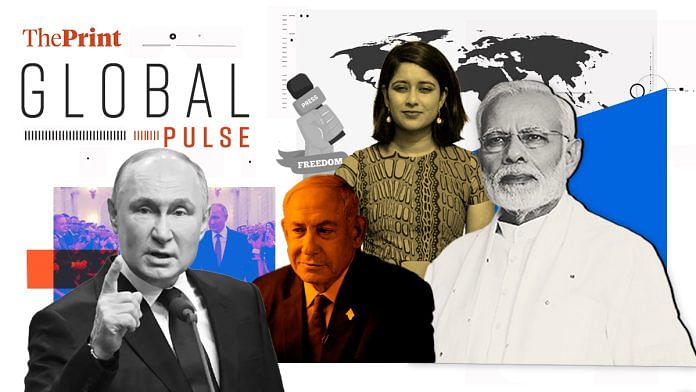New Delhi: Is the recent “nasty form of nationalism of uniting Hindus against Muslims” allowing Prime Minister Narendra Modi to say what he likes? That’s what American journalist Sabrina Tavernise discusses with Mujib Mashal, the newspaper’s South Asia Bureau Chief, in The New York Times ‘The Daily’ podcast as India heads into the fourth phase of the Lok Sabha elections.
While analysing the reasons behind Modi’s popularity, Mashal says that by using both “old and new methods” of connecting with the masses, the PM continues to wield an “enormous grip” over the diverse Indian society.
In an opinion piece in The Financial Times, its Delhi-based South Asia bureau chief John Reed examines India’s changing role in global politics — from first prime minister Jawaharlal Nehru’s ‘Non-Alignment Movement’ to now joining the US-led maritime coalition.
“India’s diplomatic and military independence is a cornerstone of its foreign policy, but a tilt towards the West has been long in coming,” writes John Reed in his opinion piece titled ‘How India’s navy changed tack’.
Despite this tilt towards the US — aimed at countering China — India stays independent with its patrolling in the Red Sea, and is “projecting soft power” by choosing the Indian Ocean region for its overseas IIT campuses, Reed writes.
But not all of its Indian Ocean neighbours have been accepting of its overtures, Reed says, giving the example of the Maldives.
“The Maldives, which alternates between pro-India and pro-China politicians in power, is in the process of replacing a small contingent of Indian troops there with civilian officials after Mohamed Muizzu won the presidency last year on an ‘India Out’ platform,” he writes, adding that for India, this is a “long game”.
In his comment in The Express UK, ‘The West must do better in its coverage of India’s vibrant democracy’, media expert Chris Blackburn argues that the Western media is unable to “capture the essence” of India and allows “biases” to cloud its coverage. “Western journalists often struggle with navigating cultural nuances, regional disparities, and the vast scale of the country,” the piece reads.
Blackburn refers to two instances from The Guardian— its reportage of the alleged assassinations of separatists abroad and an editorial from April in which it urged Indian voters ‘to think hard about giving Narendra Modi another popular mandate’.
“Instances such as ABC News Australia’s Avani Dias’s claim of being forced to leave India, later revealed to be voluntary, further erode trust between foreign journalists and Indian society,” he says.
In its special report on national payment systems from around the world, The Economist sheds light on how India’s Unified Payment Interface “is the most exciting innovation” that has taken place. It says the UPI, which started operating in 2016, “accounts for more than three-quarters of India’s digital retail payments”, and is linked to “the Indian state’s welfare system”.
It is now “going global” with links to systems in Sri Lanka, the United Arab Emirates, Singapore, Mauritius, France, and Bhutan, the report says.
Also Read: ‘Balancing act’ in India-UK ties, ‘key allies’ Adani, Ambani & ‘Hindu Vatican’ project
Putin’s speech blaming West for conflict, Netanyahu’s statement after US pauses arms shipment
In a speech at Moscow’s Red Square, Russian president Vladimir Putin accused the West of “risking a global conflict” and warned that his forces were combat-ready. To learn more about the Victory Day speech, read Al Jazeera’s report.
Israeli Prime Minister Benjamin Netanyahu has vowed to fight alone as the US paused its shipment of ammunition to Israel over human rights concerns in Rafah. We will “fight with our fingernails”, he said Thursday. To know more, read The Guardian‘s report.
Also Read: ‘Shadow ads’ spreading hate on Facebook & Canadian report on India ‘imposing agenda on Trudeau’



